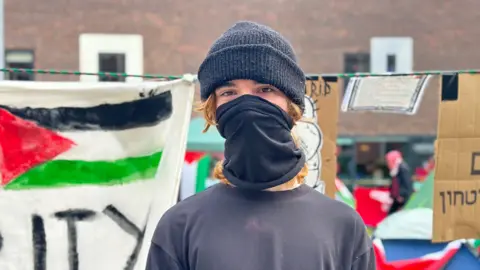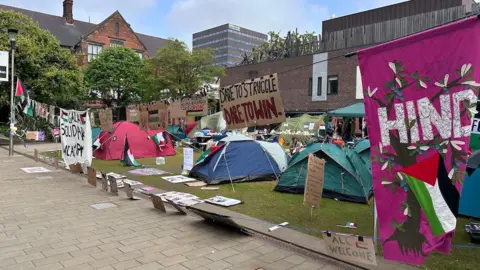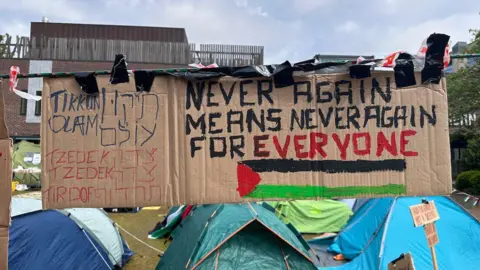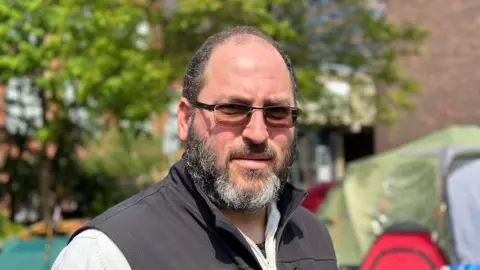Inside a 'peaceful and proud' Gaza protest camp at a UK university
 BBC/Ashitha Nagesh
BBC/Ashitha NageshOn a quiet morning outside Newcastle University, a small group of students listen to a lecturer talk about the opening song from Aladdin.
Specifically, this line: “It’s barbaric, but hey! It’s home.” She’s telling the group about Edward Said, and how his work looking at the way Middle Eastern cultures had been depicted in the West could be applied even to Disney films.
The talk then turns to how Said's theories could be applied to the portrayal of Palestinians in Western media.
While this scene doesn't sound out of the ordinary, this isn’t your usual university seminar. This lecturer was giving her talk in the middle of an encampment, which university students set up on Wednesday to protest against the war in Gaza.
Here in Newcastle, about 40 students have set up camp on the university’s quadrangle, with tents for sleeping, a makeshift first-aid centre, and tables for all the snacks donated by supporters - including crisps, water, and a Colin the Caterpillar cake.
Students themselves do coursework or exam revision on the grass, or slip off for seminars and lectures, as they would if it were student halls. Several staff members come in to show their support and drop off donations of snacks. All of those I speak to tell me they feel “proud” to see their students taking part.
 BBC/Ashitha Nagesh
BBC/Ashitha NageshRunning along the perimeter are hand-painted signs.
Naomi, who’s asked that we don’t use her full name, shows me a sign that she’d painted the night before.
“It says ‘Tzedek, Tzedek, Tirdof’,” she tells me. “It means ‘justice, justice, shall you seek’.”
Naomi says the sign - written in Hebrew - reflects how her Jewish faith has shaped her view of the conflict in Gaza.
“I was always raised with a very strong sense of justice, because of my Jewish community,” she explains, adding that the sign “encompasses so much of what my Judaism means to me”.
“In many ways, if I hadn’t been Jewish, I wouldn’t feel so firmly in solidarity with Palestine, because of the sense of social justice that my faith gives me.”
Newcastle students are just one of many student bodies across the country to set up similar occupied protests this week.
Similar outdoor camps have been erected on campuses including at Leeds, Manchester and Sheffield, while a camp outside Warwick University has been in place for 10 days. At Goldsmiths, University of London, students have occupied the library, inside the university building.
Earlier this week the Union of Jewish Students (UJS) released a statement saying campus protests in support of Gaza were creating a “hostile and toxic atmosphere for Jewish students”.
Guy Dabby-Joory, from the UJS, told me they knew there were Jewish supporters of the movement, but that they’d heard a lot of concerns from members.
These UK protests have sprung up amid the backdrop of much larger demonstrations and occupations on campuses across the US - most prominently at Columbia University, New York, and at the University of California, Los Angeles (UCLA).
Those protests have seen more than 2,000 people detained over the past fortnight.
 BBC/Ashitha Nagesh
BBC/Ashitha NageshWhile the calmness of the Newcastle camp feels a million miles away from those scenes, those who are taking part tell me that their counterparts in the US have seen what they’re doing, and have been in touch.
“We’ve had some people from Columbia message us,” Frank, another student protester, tells me. Frank’s pronouns are they/them, and they asked that we not use their real name. “They just wanted to send us their solidarity - and that is really warming to see.”
They say the group behind the occupation - Newcastle Apartheid Off Campus - had been organising in support of Gaza for several months, and that the occupation was planned before the recent disorder kicked off in the US. But the occupation was partly organised now to say to US students: “You’re not alone.”
Students in the UK share some common goals with their US counterparts - in particular, the call for their universities to sever financial and research ties with Israel, a process known as divestment.
But as well as this, Frank tells me they feel an emotional connection to students in Gaza - who, in better times, are no different to them.
“There are tens of thousands of students in Gaza, and their lives are completely upended. There's no way you can pursue an education when you've got bombs raining down on you,” Frank said.
“We’re sat in a peaceful university, studying, and they don’t have that opportunity.”
Although it’s quiet now, rallies that are held at 5pm daily attract hundreds of other students. Frank estimates there were around 200 people at the last one.
I ask one of the staff members - Dr Jemima Repo, a reader in political and feminist theory - whether she worries at all about the camp becoming disruptive during exam season.
“No, not at all,” she says. The camp itself, while on the campus and visible, is set apart from walkways and entrances.
“As far as I understand the relationship between campus security and police has been very good,” Dr Repo says, adding that there haven’t been any tensions among staff, either.
 BBC/Ashitha Nagesh
BBC/Ashitha NageshThe university, meanwhile, says it “respects the right to peaceful protests and freedom of speech” and that they are “engaging with protesters”.
“Our priority is always to ensure that our campus remains safe for everyone and protests should be within the law - we do not tolerate the use of threatening, abusive or insulting words or behaviour that causes, or is likely to cause, distress,” it said in a statement this week.
Risk assessors also come by the camp while I’m there to make sure things are still peaceful, and that there aren’t any health and safety issues.
Lecturer Dr Mori Ram also comes to chat to students and show his support. He’s originally from Israel, and has family near the border with Lebanon.
The 7 October attacks by Hamas, and the Israeli bombardment of Gaza in the months since, have deeply affected him.
“To be honest, for the first time, I feel shame. My family is there… everything that happens there, they are exposed,” Dr Ram says.
“I do think that encampments like this, and what's happening right now in the US, may provide the necessary political pressure on the Israeli government to hopefully bring things to an end, in a good way.”
But Dr Mori says he knows he’s “not a representative of the majority of Israelis” with his views on the conflict.
Mr Dabby-Joory, from the UJS, said that "Jewish students, like all student communities, are broad and diverse, and there are a range of views in the Jewish student community".
“But I think many Jewish students are feeling unwelcome, uncomfortable and on edge," he said.
“That doesn’t mean that every student is feeling it, but we know from speaking to so many of our 9,000 students across the country that so many of them are feeling those things while on campus.”
The tensions within the community, and between others from her faith and those from her political groups, have affected Naomi too.
“It’s incredibly isolating,” she tells me.
“One of the slogans that’s often used [by Jewish pro-Palestinian activists] is ‘not in my name’. And I think, well, why should it be in anyone's name.
“It's also been an incredibly isolating experience to see the reaction to pro-Palestinian activism by other Jewish people, personally and in the wider world.
“It's been quite difficult at times to feel that sense of community, which has been such a big part of my upbringing.”
